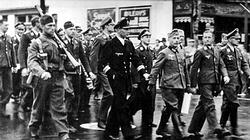 |
| 15/01/1944 |
The Peruvian Government announces
its discovery of Axis backed conspirators plotting a coup. |
| |
 |
| 23/02/1944 |
Total U.S. casualties so far are put
at 19,499 killed, 45,545 wounded, 26,339 missing and 26,754
captured. |
28/02/1944
|
The Arabs protest to the
U.S. over Senate statements about the creation of a Jewish
State in Palestine. |
| |
 |
| 07/03/1944 |
In reply to Arab protests, the U.S.
says that the idea of a Jewish state has no official sanction. |
24/03/1944
|
President Roosevelt issues
a statement condemning German and Japanese ongoing "crimes
against humanity." |
| |
 |
| 11/04/1944 |
A U.S. Delegate hands
the Swiss a cheque for $1m as reparations for the accidental
bombing of Schaffhausen. |
| |
 |
| 03/05/1944 |
Meat rationing ends in
the USA, except for certain selected cuts. |
| |
 |
| 06/06/1944 |
The West Point Class
of 1944, which includes John S.D. Eisenhower, son of the Allied
commander in chief, graduates as the Allied landings are in
progress in France. Young Eisenhower is immediately whisked
to his father's headquarters in England, but his request to
command a rifle platoon is turned down because of the risk
that he might fall into enemy hands. Fleet Admiral William
D. Leahy, who was effectively functioning as chairman of the
Joint Chiefs of Staff (a position that would not be formally
created until after the war), visits his hometown of Hampton,
Iowa on a well-publicized "sentimental journey" to
see relatives and old friends. It is part of the deception
effort to convince the Germans that the invasion of Europe
would not take place while such an important officer was out
of Washington. |
| 15/06/1944 |
Roosevelt outlines his plans for the
post-war United Nations. |
| 22/06/1944 |
President Roosevelt signs the GI Bill
of Rights which promises to provide funds for housing and education
after the war for returning US servicemen. |
| 30/06/1944 |
The United States breaks off diplomatic
relations with Finland. |
| |
 |
| 11/07/1944 |
The United States formally recognises
the provisional French government of General de Gaulle in London
as the de facto government of France. |
| 17/07/1944 |
Two ammunition-laden transport
ships explode whilst docked at Port Chicago, California. 320
sailors and other military personnel are killed in what is
the worst stateside disaster of the war. Most of the sailors
were African-Americans, who had received no training in ammunition
handling. Many of the survivors refused to load any more ships
until proper safety procedures were put in place. The so-called "Port
Chicago Mutiny" resulted in numerous court martials and
imprisonments, but the publicity surrounding the event led
directly to the end of racially segregated assignments in the
Navy two years later. |
| |
 |
| 14/08/1944 |
Roosevelt and Churchill
meet at Quebec where they initial the Morgenthau Plan that
calls for the division of post-war Germany and its transformation
into a purely agricultural country. |
| 21/08/1944 |
Representatives from the
U.K., U.S. and USSR meet at Dumbarton Oaks in the U.S.A, to
discuss post-war international security. |
| |
 |
| 16/09/1944 |
Conclusion of the Quebec
meeting between Roosevelt and Churchill who sign off on the
Morgenthau Plan for the treatment of post-war Germany. |
| |
 |
| |
|
| |
 |
| 01/11/1944 |
The first of 9,000 balloon bombs launched
against US from Tokyo reach the U.S.A. One bomb kills six people
near Lakeview in Oregon. |
| 07/11/1944 |
President Roosevelt is elected for
a fourth term and Harry S. Truman becomes the Vice-President. |
| 09/11/1944 |
Total U.S. war casualties
are now reported to have passed the 500,000 mark. |
| |
 |
| 14/12/1944 |
Congress passes and President
Franklin D. Roosevelt signs into law an act authorizing the
creation of the ranks of General of the Army and Fleet Admiral,
so that the highest American officers can attain a rank equivalent
to that of Field Marshal. Over the next week, George C. Marshall,
Douglas MacArthur, Dwight D. Eisenhower and Henry “Hap” Arnold
are promoted to the rank in the Army, while William D. Leahy,
Ernest J. King and Chester Nimitz are made Fleet Admirals.
Subsequent to the war, William F. “Bull” Halsey
will be promoted Fleet Admiral and Omar N. Bradley will become
the last General of the Army. |
